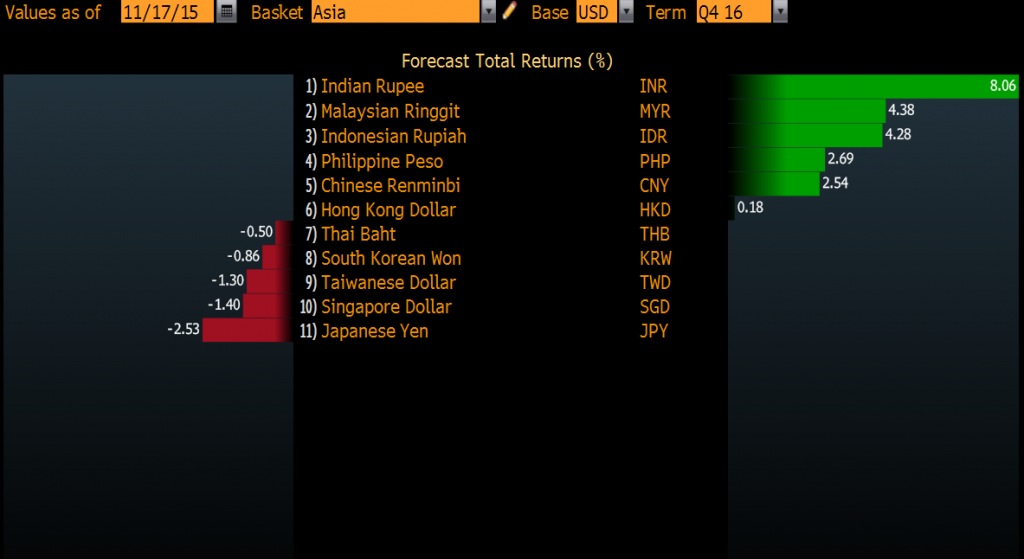India’s rupee is forecast to outperform its Asian peers as Prime Minister Narendra Modi travels the world to woo investors and opens up the region’s third-largest economy.
Modi, who faces criticism at home for making 30 overseas trips since taking office in May 2014, has won about $160 billion in pledges for loans and investment from companies including Vodafone Group Plc and Hyundai Motor Co. He also eased restrictions on outside involvement in 15 industries before traveling to London and Turkey last week, with Malaysia, Singapore and Paris next on his itinerary. Foreigners are buying more Indian debt after the central bank relaxed curbs last month.
The currency will earn 8.1 percent, including interest, by the end of next year, the region’s best total return, according to Bloomberg surveys of strategists. Modi’s efforts to attract investment will support the rupee by countering outflows when the U.S. raises interest rates, according to ABN Amro Bank NV, the currency’s top forecaster.
“The opening of foreign direct investment is clearly positive as it would help attract funds to stimulate the economy,” said Roy Teo, a senior foreign-exchange strategist at ABN Amro in Singapore. “The rate hike expectation in the U.S. will result in some vulnerability in the rupee, but because of the improving growth outlook, economic reforms and the Reserve Bank of India’s intervention, the currency will be quite resilient.”

The rupee, which is projected to weaken 0.5 percent to 66.50 a dollar by Dec. 31, will remain fairly steady though 2016 before ending the year at 66.40, according to the median estimate in a Bloomberg survey. ABN Amro and ING Groep NV, which had the most accurate estimates in the last four quarters in Bloomberg’s rankings, predict it will end 2015 at 66, little changed from 66.16 on Wednesday, while JPMorgan Chase & Co. sees an advance to 65.50.
Investing in rupees will become more attractive due to higher returns and the central bank’s resolve to keep inflation in check, RBI Governor Raghuram Rajan said in a Nov. 3 interview. Rajan has taken a series of steps to address risks, including boosting foreign-exchange reserves to record levels and opening the government bond market.
Global funds have increased their holdings of rupee-denominated bonds by $8.5 billion this year, lured by the best gains in Asia. Bonds returned 7.9 percent in 2015 compared with 6.4 percent on Chinese notes and 2.7 percent on Indonesian securities, indexes compiled by Bloomberg show. India’s 10-year sovereign notes yield 541 basis points more than similar-maturity U.S. Treasuries.
■‘Make in India’
Modi’s is targeting global manufacturers with his “Make in India” campaign and touting the country’s credentials as the world’s fastest-growing major economy. The leader has visited 28 countries since his inauguration and won at least $160 billion in financing and investment pledges, according publicly announced figures compiled by Bloomberg News.
These include $22 billion in agreements between Indian and Chinese companies for power plants and industrial parks, $75 billion from the United Arab Emirates for an infrastructure investment fund, and $28 billion from Japan in loans and investments for smart cities, transport systems, river projects and clean energy. Hyundai Motor said in May it’s considering building a third auto plant in India after Modi visited South Korea. Last week in London, Indian and British companies agreed on $13 billion of deals.
Congress Party’s vice president, Rahul Gandhi, last week criticized Modi’s foreign visits saying he should focus more on the problems of poor farmers and the youth, whom he had promised jobs.
■Political Opposition
The rupee weakened 4.7 percent this year as opposition lawmakers sought to block key economic reforms while portraying his government as intolerant of religious minorities. Modi eased rules for industries from cable and direct-to-home TV services to construction days after his political party lost elections in the eastern state of Bihar.
Barclays Plc predicts further losses saying the Federal Reserve’s monetary tightening will trigger outflows from emerging markets like India. The lender expects the rupee to weaken to 67.50 a dollar by end of 2015 and to 70.50 by the end of 2016.
“It will be difficult for the rupee to avoid depreciating pressure as the Fed starts raising rates,” said Mitul Kotecha, head of foreign-exchange and rates strategy for Asia at Barclays in Singapore. “China is expected to further weaken its currency.”
Foreign direct investment jumped 30 percent from a year earlier in the April-June period to $9.5 billion, the latest official data show. Inflows rose 27 percent to $30.9 billion in the year ended March 2015, short of the record $35.1 billion level three years earlier.
“The signal the government is trying to send is that they are very determined about reforms and minor setbacks are not going to deter them,” said Teo of ABN Amro. The FDI easing “will bring in long-term inflows, rather than volatile flows.”